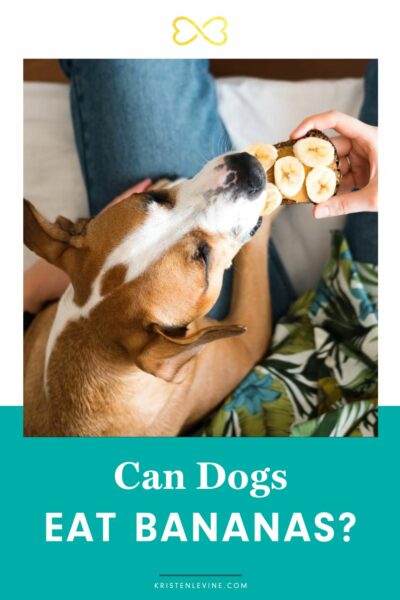
Can Dogs Eat Bananas?
Whether you enjoy sharing food with your furry BFF or not, chances are high that your pup spends a decent amount of their day waiting for you to drop a scrap of food you’re preparing from the counter to the floor, right into their territory.
A few human foods are dangerous for dogs to eat, and those should be avoided at all times. However, some foods, particularly fruits and vegetables, may be confusing for dog parents. You’d be surprised how often our readers wonder, “Can dogs eat bananas? Carrots? Onions? Lollipops?” The list goes on and on, and it can be overwhelming to remember all the dos and don’ts of safely feeding your pup treats.
Bananas are a common fruit we humans love and recognize for their tasty flavor, bright and sunny appearance on the countertop, and incredible health benefits. Why wouldn’t your pup want in on this yummy snack?
As thoughtful pet parents, we’ve all had to Google whether a food is safe for dogs at one point or another. It’s basically a rite of passage as a pet lover. You want what’s best for your pet, which means learning toxic foods that they should avoid and the ones you can share together.
So…can dogs eat bananas? Let’s find out!
Are Bananas Good for Dogs?
Offering your pup some slices of banana can be a delicious and nutritious snack. They contain many beneficial vitamins, minerals, and electrolytes. However, since you’ll only be feeding your pup small amounts, the nutritional benefits from this fruit won’t be significant.
If you’re wondering what the health benefits are when dogs eat bananas, we’ll explore that in the next section.
Pin me!

The Health Benefits of Bananas for Dogs (and Humans!)
Bananas have quite a few vitamins and minerals that can be beneficial to your dog. The most important vitamin in bananas is vitamin C. It’s an essential antioxidant that helps reduce aging in dogs and reduces inflammation. One banana has about 10 mg of Vitamin C. Here are a few of the other beneficial vitamins and minerals that can help your pooch in the short and long term.
Potassium
Dogs require potassium to keep their heart pumping in a strong, healthy rhythm. Potassium also assists with the electrical charges in the muscles and nerves, ensuring your pup can run, play, and dig holes to their heart’s content. One banana has about 420 mg of potassium, making it a rich fruit option for your busy pup!
Fiber
Fiber helps your dog’s digestive system function properly, helping to avoid health issues like constipation, diarrhea, or more serious conditions like colon cancer. One banana has about 3 grams of fiber.
Magnesium
Magnesium is a powerful mineral that benefits dogs in a few significant ways. It promotes bone strength and helps with the absorption of other essential minerals in your pup’s body to keep them strong, energized, and healthy.
Drawbacks and Health Hazards Related to Bananas

Unfortunately, a few health hazards exist for dogs who eat bananas too frequently. The most concerning is the sugar intake, with banana peels also at the top of the list. This section will explore some of the drawbacks and health risks associated with letting your dogs eat bananas.
High Sugar Content
One banana contains 14 grams of sugar. While dogs should never consume man-made sugar products, natural sugar from fruits and vegetables is safe in moderation. However, depending on the size of your dog, if they eat a whole banana or several bananas, their sugar consumption will spike. Side effects of too much sugar in your pup’s diet include vomiting, diarrhea, and general discomfort in the stomach region.
Can Dogs Eat Banana Peels?
Banana peels are stiff and difficult to chew, which can cause a blockage in your dog’s throat as they try to swallow them. Peels can also cause a blockage within your dog’s stomach lining, which can cause a lot of harm to their intestines and other organs. All that to say—it’s best to avoid feeding your dog any banana peel.
Can Dogs Eat Banana Chips?
While feeding your dog bananas is generally safe, banana chips aren’t recommended as snacks for them for a few reasons. Banana chips from grocery stores often contain preservatives and high levels of sugar. According to the USDA, a 100-gram serving of banana chips can contain 35.3 g of sugar. Also, while rare, these dry chips could pose a choking risk or cause an obstruction in your dog that might require surgery.
You can certainly let your pup sample your banana chips, but offer them sparingly and under your watchful supervision. Fresh bananas are always a better option..
Can Dogs Eat Banana Bread?
If your dog does not have a grain or wheat allergy, banana bread can be great dog treats to feed them on occasion. If you’re making banana bread from scratch for your dog, try to use pup-safe ingredients, like honey (as an alternative to sugar), plain rolled oats, and so on.
Avoid using xylitol and letting your dog consume any food items that contain this artificial sweetener. When dogs consume something that includes xylitol, it is swiftly absorbed into the bloodstream, which could lead to a powerful surge of insulin from the pancreas. This sudden insulin surge can lead to a quick and significant drop in blood sugar levels (hypoglycemia), an effect that may take place just 10 to 60 minutes after the xylitol was consumed, says veterinary doctor Martine Hartogensis from the FDA. If left untreated, this rapid drop in blood sugar can swiftly become lethal.
Is There Such a Thing as Too Much Banana?
So can dogs eat bananas? Yes, they’re great as occasional treats and snacks. As with any food, moderation is always key. If you’re wondering how much banana is too much, try to give your pooch a slice or two a day to see how their body handles it. Be sure to monitor them for any allergic reactions, vomiting, or diarrhea. If they experience any of these symptoms within 24 hours of eating a banana, it’s best to call your veterinarian and follow their recommendations.
How Much Banana Can I Give My Dog?
Depending on the size and weight of your pup, anywhere from a few slices to half a banana per day is typically a safe amount.
Feeding your furry friend too much banana might lead to an upset tummy and potential weight gain. For this reason, if your dog is overweight or diabetic, avoiding bananas may be wise. Be sure to consult your veterinarian before adding any new foods to your dog’s diet, regardless of their health.
For smaller dogs, slice a few small bites of banana and watch them closely as they eat. Because smaller dogs have smaller mouths and teeth, they need smaller bites to consume any kind of food, human or animal, safely. If you have a larger dog, half a banana per day is plenty.
Keep in mind that around 90% of your dog’s diet should be their standard dog food (whether this be kibble, wet food, and so on). Any other add-ins like dog treats (including bananas and other fruits) should take up just 10% of their daily diet. This may offer helpful insight into how frequently your dog should eat bananas.
Letting Your Dog Eat Bananas

Feeding your dog bananas is fairly straightforward, and you can prepare the fruit for snacking in a few easy ways. Here are the most common ways to feed your dog bananas.
Sliced
Sliced bananas are ideal for smaller dogs as they’re much easier to eat. Cut 1/2-inch thick slices of banana for your smaller dog or one-inch thick slices for a larger dog. Add the slices to your dog’s food or serve them as a treat.
Mashed
Feeding a dog a mashed banana is particularly common for smaller dogs needing smaller bites or older pups with delicate or no teeth. To mash, take a few slices, place them in a shallow bowl, and smash them with a fork until they’re mushy.
Frozen
A refreshing treat on a hot summer day, frozen bananas are a great snack for dogs and humans alike. You can keep the bananas whole, slice them up, and pop them in a resealable ziplock bag in your freezer. If you keep them whole, just be sure to remove the banana peel because it’s quite difficult to remove once the fruit is frozen.
With Peanut Butter
Name a better duo than a banana and peanut butter…we’ll wait! Mix a small amount of peanut butter with mashed bananas, or dip a slice of banana into peanut butter and hand-feed it to your dog or place it in their bowl. Before you make that delectable snack, check the peanut butter ingredients list for xylitol. Some peanut butter brands use xylitol as a sweetener.
The Final Woof: Are Bananas Good For Dogs?
Now that we know the answer to the question “Can dogs eat bananas?”, remember that, like so many delicious treats, moderation is key! Bananas are a healthy snack for dogs of all sizes and breeds in controlled settings (especially once you’ve observed them after eating one and you know they aren’t allergic).
While you should never let your dogs eat banana peels, the fruit can be a tasty snack rich in vitamins and minerals. When you want to reward your pup with something other than dog food, letting dogs eat bananas is a solid choice.







Comments (0)